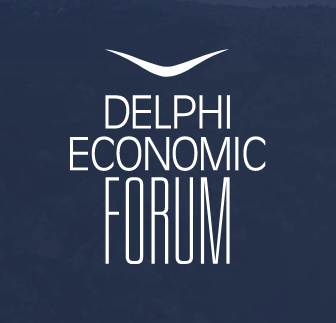
Delphi Confidential | Friday, April 28, 2023
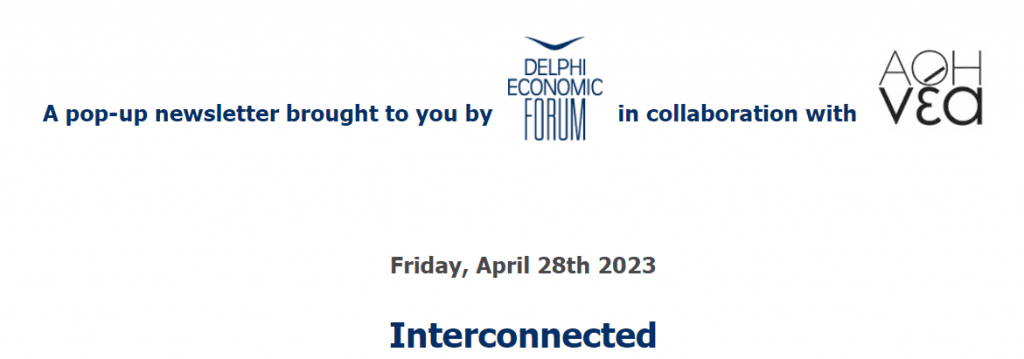
Thursday was another full day at the Delphi Economic Forum, with the global economy taking center stage. In fact, sessions included various discussions on the interplay between geopolitics, world affairs and the economy, with Secretary General of the OECD Mathias Cormann pointing to new challenges that threaten to hinder global growth.
The head of the OECD predicted that inflation globally will remain high until the end of next year, noting that global growth remains vulnerable. However, he emphasized that the pace of the global economy has improved, expressing optimism.Asked what he considers the biggest challenges for the global economy at the moment, Mathias Cormann emphasized the war in Ukraine, as there is no immediate ending to this conflict in sight, also pointing to the perverse effect of structural inflation, caused by the rise in energy prices.
He also remarked that perhaps the greatest of all challenges we are currently faced with is climate change, as the greenhouse effect knows no borders and policies must be developed by all states in the effort to save our planet.
You can access the latest Delphi Economic Forum agenda, here.
Share your thoughts on social media, using the hashtag #DelphiForum.
What to Expect from Today
- World affairs will be explored from a variety of angles at Artemis Hall in the European Cultural Centre of Delphi (ECCD) throughout the day.
- Friday kicks off with a series of sessions on the real estate market at Karamanlis Hall (ECCD), followed by afternoon sessions focusing on investments.
- Ahrweiler Hall (ECCD) will host numerous sessions on energy that will continue throughout the day.
- Franco-hellenic dialogue workshops will be taking place in the morning at Exhibition Hall (ECCD), followed by a series of sessions on classics.
- The relationship between people and the state will take center stage at Leto Hall of Amalia Hotel in the morning, followed by a shift of focus to world affairs, which will culminate in a fireside chat with Greek Prime Minister Kyriakos Mitsotakis.
- At Apollon Room, Ermis Room and Ianthi Room (Amalia Hotel) the name of the game today is the future, in all its facets
- For a detailed conference agenda, please click here
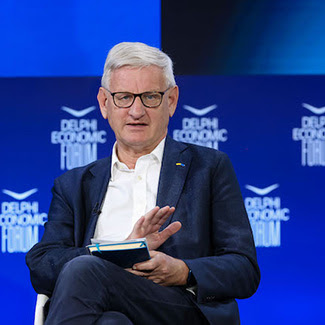
Carl Bildt, former Prime Minister of Sweden, stated that “we are now in a period of profound dangers”. “We must prevail in Ukraine, for Ukraine primarily but also for the global order”, he warned. The impact of a loss in Ukraine for the credibility of the West would be disastrous, Bildt supports, with terrible consequences. He also spoke of the importance of more engagement with global issues to illustrate the West’s commitment to a broad view of the world to stave off accusations that it is only preoccupied with itself. “We need to build credibility with the Global South and international alliances”, he said
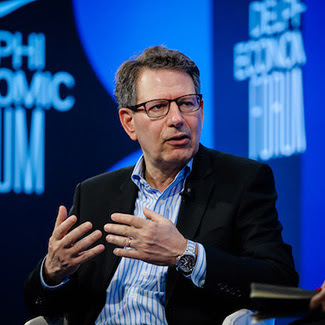
Robert Strausz-Hupé Chair of Geopolitics at the Foreign Policy Research Institute Robert D. Kaplan discussed the war in Ukraine. “For Putin, the worst-case scenario is a successful Ukrainian counter-offensive this summer”, he said, focusing particularly on the Crimean Peninsula. On the other hand, the worst-case scenario for Ukraine is a failed counter-offensive that would force an armistice, he noted. “China is becoming more influential because the longer Russia is involved in Ukraine, the weaker Russia becomes in Central Asia, Siberia and the Far East”, regions China is moving into.

General David H. Petraeus, former Commander of ISAF, former Director of the CIA and Chairman of the KKR Global Institute, spoke of the many global changes taking place around the world. “There has been a seismic, profound transformation in geopolitics from a world of benign globalization a decade ago to an era of renewed great power rivalries”, where barriers to trade are being erected, with “globalization turning into slow-bilization”. However, there is also unity. “The greatest unity in Europe since the Second World War”, he said, while also stating that Putin, ironically, revitalized NATO.
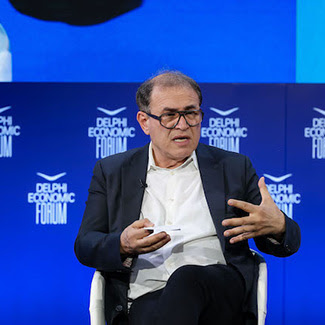
Professor Emeritus at NYU and CEO of Roubini Macro Associates Nouriel Roubini discussed the many risks facing the global economy, including non-economic risks with economic dimensions like geopolitics, social issues, healthcare emergencies and climate issues. He also talked about AI and machine learning, which, despite their benefits, pose risks including permanent technological unemployment. “Often governments have used technological innovations to build bigger weapons to fight bigger wars”, he said, warning of a future escalation.

Credible Partners
- Bob Menendez, US Senator for New Jersey and Chairman of the Senate Foreign Relations Committee, spoke of energy security in the region in a televised message to the forum. “Dangerous leaders like Erdogan or Putin are willing to use energy as a weapon”, he said. He mentioned that Europe will have to adapt to a world without Russian energy resources, and the Eastern Mediterranean has proven that it is an important part of the solution. “We need to make sure we are using US tools to support projects coming out of the Eastern Mediterranean”, he emphasized, making special mention of Alexandroupolis. “All these efforts will pay security dividends”, he noted.
- Former Minister of Foreign Affairs Dora Bakoyannis celebrated the efforts of Senator Menendez in making the Eastern Mediterranean an area of priority for US foreign policy. “The 3+1 cooperation scheme can play a key part” in promoting stability in the region, through cooperation on a wide variety of sectors. “There can be no question that our strategic planning here in the region will increase energy interconnections between the Eastern Med and Europe, increasing stability”, she noted. “Greece time and again has been an honest broker for peace and cooperation”, she added, stating that “Greece is one of the more reliable and credible partners in the region”
- Harris Georgiades, Chairperson of the House Standing Committee on Foreign and European Affairs of the Republic of Cyprus, said that “3+1 has been a major policy objective for some time”, stating that it is directly related to the political position of Cyprus in the West. He added that the United States involvement in the Eastern Mediterranean is a must for the region. “Our political partnership should emphasize the need to collaborate on energy and other aspects of this relationship”, he said, adding that European security and rules-based international order will all be tested in the Eastern Med

Macro Focus
- Prem Watsa, CEO of Fairfax Financial Holdings, said that Greece is in a great position, having entered a “virtuous cycle” which offers very significant opportunities. However, he called for political stability and business-friendly policies. “The investment grade opportunity is very significant in Greece”, said Watsa and shared his belief that a few months after the elections the country will be upgraded. “Private debt is very minimal” compared to the rest of Europe, he noted. He also highlighted the role of the Greek diaspora.
- Chairman of the Finance Committee of the Parliament of Estonia Annely Akkermann said that the Russian invasion of Ukraine was the primary cause of the high rate of inflation recorded in Estonia, as its proximity to the warzone, as well as the subsequent sanctions severely destabilized several sectors of the economy. Akkermann addressed the high concern over energy prices by the Estonian populace and how the government responded.
- Global Chief Economist at Kroll and Senior Fellow at Brown University Megan Greene spoke of the differences between the United States and Europe in terms of inflation and unemployment, including the massive stimulus packages. “The good news is that there’s something central banks can do about demand”, said Greene, unlike the supply-side of things.
Shipping Decarbonized
- “Shipping offers Greece a geopolitical voice that other sectors do not give us”, noted VP of the Union of Greek Shipowners and President of Enesel SA Adonis Lemos. In this respect, the more shipowners are based in Greece, the greater the potential for the creation of educational and technological hubs, and, as a result, the more jobs, with multiplier benefits for the entire Greek economy. He also highlighted the need to measure shipping emissions, reiterating that the adoption of a global regulatory framework is key to achieving this goal. “Building new ships is much better than trying to make existing ships more efficient”, he suggested.
- Dimitrios Fafalios, Secretary of the Union of Greek Shipowners, President at Fafalios Shipping and President at INTERCARGO, noted that “Greek shipping is very committed to decarbonization”. “It’s not that we don’t have the will, the problem lies in the fact that we have limited capabilities”, he said, stressing the importance of developing business models that can bring about efficiency. “We need to find the balance between efficiency and decarbonization”, he concluded.
- President of the European Community Shipowners’ Association (ECSA) in Cyprus Philippos Philis shared his realization that, in the face of the climate crisis and decarbonization, “we prefer a global solution rather than regional ones in the shipping sector”. He also stressed the urgent need for cooperation between all industry players
International Shipping Hubs
- “Greek shipping may be on top at the moment, but staying on top is harder than getting there”, stated CEO of Lavinia Corporation & Laskaridis Shipping Company Ltd. Panos Laskaridis. He explained that the regulations adopted by the EU make international cooperation more difficult. In this context, he argued that the consolidation of European shipping on the international scene can only be achieved through regulations that favour both staying in Europe and simplifying bureaucratic procedures when loading and unloading a ship.
- Faye Frangedis, Director of Trafigura Maritime Ventures Limited, noted that Greece is a strategic gateway between Europe and Asia, a part of the EU and home to a talented workforce, making it a great environment to do business in shipping. “We have also seen many international companies open up operation offices in Greece in recent years”, she added.
- “At the moment there is no representation of Greece in Panama”, observed the former Ambassador of Panama in Greece and General Director & Owner of Panama Shipping Agency Antonio Taquis. He also referred to the important Greek community in Panama, noting that the latter is an ideal place for investment, especially for Greeks, greatly reducing the bureaucracy required in this direction. He added that Panama constitutes a significant political hub on the international scene.
Delphi Dashboard
| In addition to Delphi Confidential, you can follow the latest updates and key insights of the conference by tuning into out special live-blogging page Delphi Dashboard, which the team of αθηΝΕΑ will be updating for the duration of the convention. Bookmark this page for live insights from this year’s conference. |

Strategic Autonomy
- Ambassador of Sweden to the Hellenic Republic Johan Borgstam discussed European strategic autonomy and the continent’s relation to the United States. The ambassador also commented on Sweden’s aspiration for NATO accession. “It is very clear that it is a new Russia that has emerged”, highlighting the importance of collective defence.
- Markus Ferber, Chairman of the Hanns-Seidel Foundation and Member of the European Parliament, discussed the state of strategic autonomy of Europe, saying that it is not as easy a goal as often presented. He also highlighted the important role of the European Parliament in the further defense integration within the Union. “It has changed significantly, even before the invasion of Ukraine”, he said, commenting on earlier views of the European Parliament as a “Peace Parliament”. “Europe has learned its lesson”, he concluded, looking at Germany itself and its choices following the end of the Cold War.
- Director of Carnegie Europe Rosa Balfour focused on the European single market. “It has created a system whereby European prosperity is tied to interdependence”, she mentioned, but pointed out that we now live in a world where there have been shocks to globalization and Europe may have to find its place. She also discussed the future of Europe as a “third power” between the US and China.
- Ivana Dragicevic, Journalist and Europe’s Future Fellow at IWM Vienna, discussed the need for Europe to be resilient, also looking at questions of dependencies. Dragicevic also stated that Europe can play a role of being a bulwark of liberal democracy.
Stream the Forum
If you were not able to join us in Delphi this year, you can always participate in the forum by streaming its sessions from afar. Simultaneous live streams will be broadcasting the proceedings of Delphi Economic Forum VIII, accessible on the forum’s website.
Download the App
Make sure to download the Delphi Economic Forum VΙII App for an improved conference experience.
The steps for the app are the following:
1.Visit delphiforum.gr/app
2.Download and install the app
3.Use Secure Key: delphi#23
4.Navigate through the agenda and start networking

Voting Time
- Nikos Androulakis, President of PASOK-KINAL, answered questions about the possibility of his party participating in a coalition government following the upcoming elections, identifying a strong KINAL showing as a precondition to be able to negotiate. He also discussed the need for programmatic convergence on key issues and the assumption of the premiership by a person of common approval, other than Kyriakos Mitsotakis and Alexis Tsipras. He explained why citizens should trust both him and his party, pledging to bring about transparency and credibility.
- Former Deputy Prime Minister of Greece Evangelos Venizelos discussed the role of PASOK in a future governmental coalition, stating that, having borne the brunt of the fallout from the financial crisis, the party cannot just be a complement to any government, but instead must maintain a sense of its own strategy. “We cannot threaten or be threatened that something will happen”, he said, stating that Greece has returned to normality. Either everything is fine, or everything is at risk he said, rejecting the political discourse in Greece that presents both at the same time.
- Alexis Patelis, Chief Economic Advisor to the Prime Minister, introduced the significant value attached to regaining the investment grade for the Greek government. “Why haven’t we been granted investment grade? Because of the elections”, he explained. Patelis defended the work of the government and attacked SYRIZA, both as a government and opposition. “Problems are not solved when they appear, but earlier”, he noted.
Greece and the World
George Tsunis, US Ambassador to Greece, began by discussing the Russian invasion of Ukraine, stating that it would be an “unfortunate by-product” if Russia and China become closer as a result of the war. Tsunis stated that it was the intention of Russian President Vladimir Putin not to compromise, despite many approaches made by the West. He also praised Greece’s response to the invasion of Ukraine. “Where else would the US turn to in order to solve challenges in the region than Greece”, he said, highlighting the country’s important role in US strategic planning.
Minister of Tourism Vassilis Kikilias shared his expectation that 2023 will be a record-breaking year for Greece, with a 10-20% increase compared to 2022. He noted that tourism in the country is no longer seasonal and is strategically built to last longer and be of higher quality, leaving more income for Greeks. He noted that 105 million euros were allocated to “social tourism” by the government, allowing thousands of Greeks to enjoy a decent holiday.

Health Über Alles
- Greek Minister of Health Athanasios Plevris discussed the increase of the state budget awarded to healthcare, stressing that “there is need for more resources, but also more targeted resources”. He also said that the aim is to support innovation in healthcare, but we must also support production, so that we do not depend on foreign countries and producers.
- Alternate Minister of Health Mina Gaga spoke about the government’s plan for the healthcare sector, using technology, the interconnection of various healthcare structures and the digital patient health record, adding that there should be a dialogue between all stakeholders to identify and address problems in the healthcare system.
- President & Managing Director of AstraZeneca Greece & Cyprus Elena Chouliara spoke about the role of the pharmaceutical industry in health, noting that 3 billion vaccines were made available





